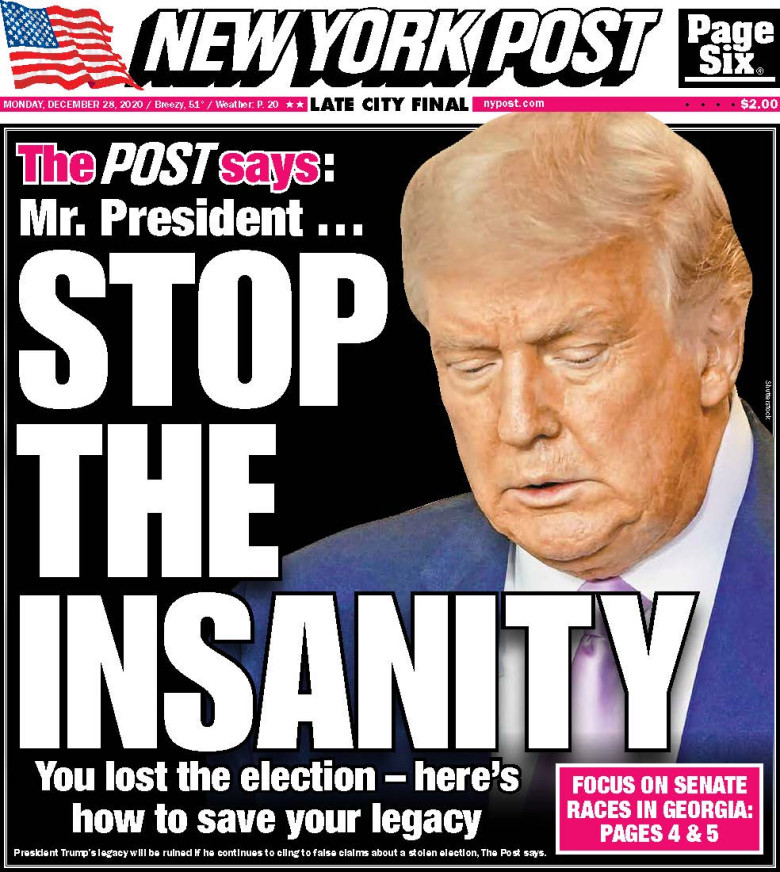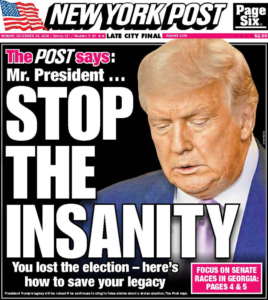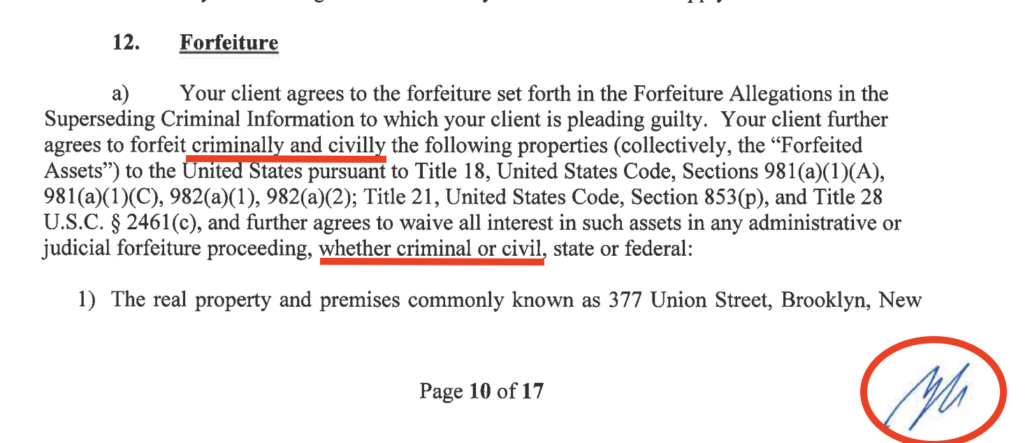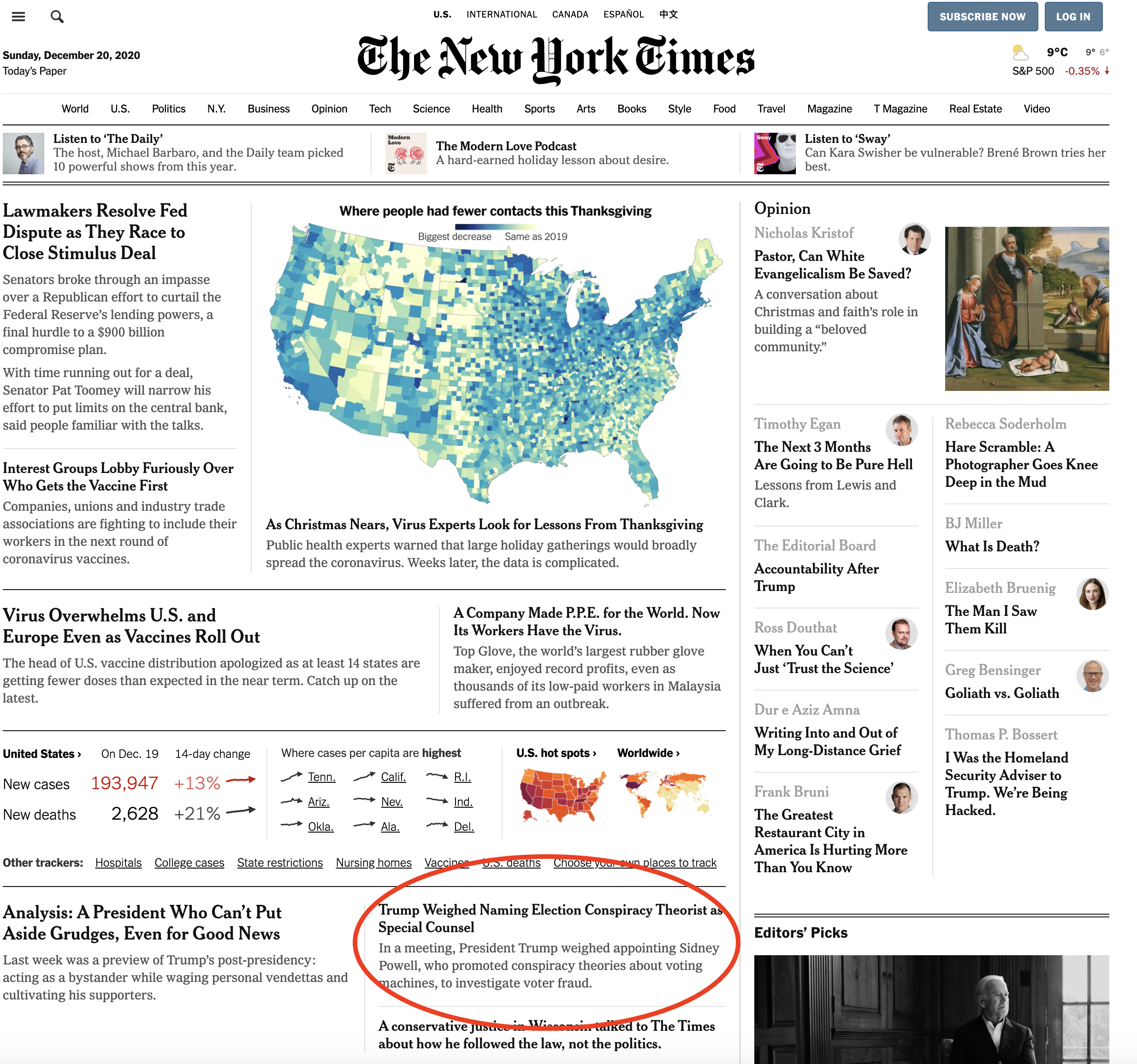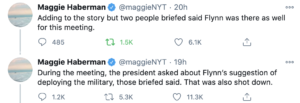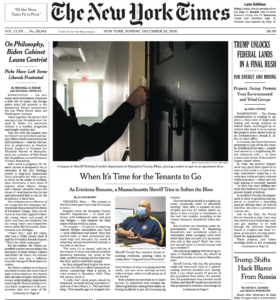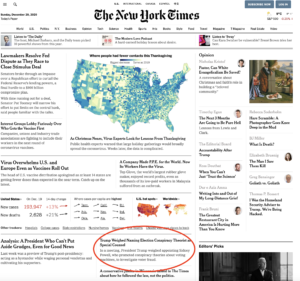Two years ago today, Mike Flynn went before Judge Emmet Sullivan to be sentenced. Had things gone as planned, he may well have been sentenced to two years of probation, meaning that — today — he would be a free man, a felon (though a felon still in the queue for a Trump pardon), but nevertheless a man who had paid his debt to society.
Things didn’t go as planned.
In the days before his sentencing, Flynn got cute by introducing details about the circumstances of his interview, details which he had known about when he pled guilty just a year before and certainly knew when he pled guilty again two years ago. Judge Sullivan may well have sentenced Flynn to a short sentence in any case — no more than a month, or more realistically the two weeks Papadopoulos got without any cooperation (in which case Flynn would still likely have been done with probation by inauguration). But he would likely have given great deference to the government support for a probation sentence had Flynn not complained about the way he was treated.
But having complained, Judge Sullivan required that DOJ share the documents Flynn had relied on, including Andrew McCabe’s notes setting up the interview, the 302 from his original interview, and a 302 of an interview from Peter Strzok (over time, DOJ would release serially less redacted copies, with further damaging details); together, those documents started to make it clear the degree to which Flynn was protecting Trump.
Sullivan put Flynn back under oath and made him swear that he knew it was a crime to lie but did it anyway.
And he expressed disgust for what Flynn had done.
You know, I’m going to take into consideration the 33 years of military service and sacrifice, and I’m going to take into consideration the substantial assistance of several ongoing — several ongoing investigations, but I’m going to also take into consideration the aggravating circumstances, and the aggravating circumstances are serious. Not only did you lie to the FBI, but you lied to senior officials in the Trump Transition Team and Administration. Those lies caused the then-Vice President-Elect, incoming Chief of Staff, and then-Press Secretary to lie to the American people. Moreover, you lied to the FBI about three different topics, and you made those false statements while you were serving as the National Security Advisor, the President of the United States’ most senior national security aid. I can’t minimize that.
[snip]
I’m not hiding my disgust, my disdain for this criminal offense.
When Flynn got cute, I warned, “be careful of what you ask for.” I had no idea at the time how right I was.
Consider what Flynn has lost in the two years he might have been serving probation, all in an attempt to avoid accountability for lying to protect Trump. He:
- Replaced competent lawyers with incompetent TV grifters
- Released evidence he lied to his lawyers doing the FARA filing
- Consented to waive privilege so DOJ could find more proof he lied
- Debunked a slew of conspiracy theories
- Got really damning transcripts released
- Served 708 days of supervised release
- Joined a gang
- Got one of his gang members prosecuted for death threats against Judge Sullivan
- Got a ruling — and, later, a clear statement from DOJ — that no abuse occurred
- Exposed his son to further prosecution
- Exposed DOJ to further scrutiny
- Proved Judge Sullivan’s point about selling the country out
Replaced competent lawyers with incompetent TV grifters
In June, Rob Kelner made official something that Sidney Powell has more recently revealed had happened earlier: Flynn replaced the very competent Covington & Burling (who, records would later show, had written off millions of dollars of work they did as the FARA investigation turned into a prosecution) for Sidney Powell.
This was a mistake.
Along the way, Powell made several errors of procedure which would have been important if she had a case. For example, Powell introduced a motion to dismiss in her purported Brady claim, somewhat mooting the claim for when she raised it again the next year. Powell did not object to Judge Sullivan’s response to the motion to dismiss in timely fashion. Powell never moved to recuse Sullivan until September 2020, effectively waiving accusations she floated throughout the process. These were all procedural issues that, even if her argument were sound, she’d also have to get correct, which she did not.
She also did a number of things that Sullivan found to be unethical, including misciting things and the initial letter to Barr (though he did not sanction her).
Most insanely, Powell had Flynn submit a sworn declaration that materially conflicted with his two earlier guilty allocutions as well as his EDVA grand jury testimony. Effectively, to beat a false statements charge he might have gotten probation for, Powell had Flynn perjure himself.
As this post makes clear, Powell got Flynn less than nothing for his troubles. In early January, after twice delaying to get the requisite approvals from Bill Barr’s DOJ, prosecutors called for prison time, noting that Flynn had disclaimed his guilty plea and blown up his cooperation.
Worse, after the way Powell went nuclear on Covington, accusing them of incompetence and ethical failures, no sane attorneys would represent Flynn going forward. If he gets back into legal trouble, he’ll be stuck with someone whose approach to lawyering amounts to propaganda rather than sound legal advice. Without the bailout of a pardon, then, things could work out far worse going forward.
Released evidence he lied to his lawyers doing the FARA filing
Immediately after replacing Kelner, Flynn’s lawyers tried to use Judge Anthony Trenga’s rulings from EDVA (which were premised on moves DOJ had to take after Flynn reneged on his prior testimony) to suggest the whole thing was a set-up. Even in her first submission, Sidney Powell was making demonstrably misleading claims. Importantly, some of the evidence she submitted — particularly with respect to the purpose of an election day op-ed Flynn published under his own name — proved that Flynn lied to his lawyers. For example, Powell submitted evidence to both dockets showing Flynn had claimed, to his Covington lawyers, to have written the op-ed published on election day to help Trump, when in fact he had instead pasted his name on it to serve the government of Turkey.
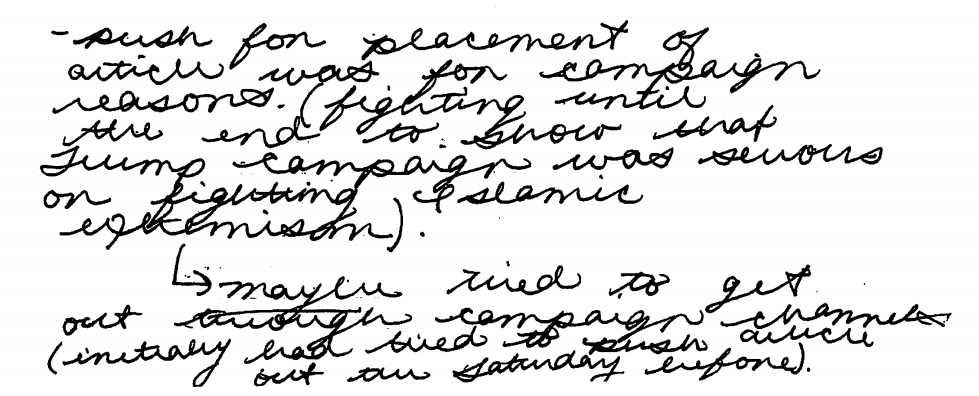
Consented to waive privilege so DOJ could find more proof he lied
Starting in fall 2019 and then doubling down after DOJ called for prison time, Powell started accusing Covington & Burling of having an unwaivable conflict. DOJ provided documentation that Flynn had been alerted to the possible conflict, but waived it. Flynn provided more evidence that DOJ had gotten that waiver. Flynn provided evidence that Covington not only told him, repeatedly, about the potential conflict, but arranged to have another lawyer he could consult about it. But still Powell persisted in accusing Covington of setting Mike Flynn up for a fall.
In response, DOJ requested and got Flynn to waive attorney-client privilege so DOJ could show more evidence than they already had that Flynn lied to his lawyers in preparation of the FARA filing. DOJ was about to submit their first collection of this proof to the docket when Barr moved to dismiss the prosecution.
But that evidence remains at DOJ and the limits on the waiver — basically prohibiting its use against Flynn — don’t cover its use for a retrial of Bijan Kian (possibly with Flynn’s son added). Indeed, Judge Trenga already approved a limited waiver of privilege for the first trial. While DOJ would have to request to use this information in such a trial, it has possession of it and knows what it includes.
Debunked a slew of conspiracy theories
The first thing Sidney Powell did after she fully took over the case was, in the guise of accusing DOJ of failing to comply with Judge Sullivan’s standing Brady order, accuse DOJ of withholding material information. The vast majority of these claims were conspiracy theories with no more basis than Powell’s bullshit claims that dead Hugo Chavez stole the election for Joe Biden. They include claims that:
- A meeting between Bruce Ohr and Andrew Weissmann harmed her client, who was investigated by none of them
- Nellie Ohr had any role in Flynn’s prosecution
- Reporting from Stefan Halper was key to the predication of an investigation into Flynn, including that an allegation Svetlana Lokhova honey trapped him
- A claim that Joseph Mifsud was at the RT Gala Flynn was paid to attend
- Section 704b spying that Mike Flynn supervised briefly had instead been focused on him
- A claim, repeatedly reported in frothy right propaganda, that McCabe had said, “First we fuck Flynn, then we fuck Trump”
- A claim there was an original 302 that didn’t match every other document in the case
This might be thought of as a reverse subpoena to DOJ — and it matched a letter Powell sent Bill Barr, which prosecutors shared with Sullivan in their response (and which he’d return to after Barr attempted to blow up the prosecution altogether). Much of the material has been released in the last year. It doesn’t say what she imagined it would say, and much of it directly debunked her conspiracy theories.
Along with these conspiracy theories, Powell made false claims about the proceedings before Sullivan, claiming Brandon Van Grack never provided the damning texts between Peter Strzok and Lisa Page, that summaries Judge Sullivan had approved were inadequate,
Both DOJ and Sullivan himself mapped out each alleged lie and showed where it appeared in the 302s. DOJ also submitted all the 302s, to show they never wavered in their content. Much later, DOJ submitted notes from a meeting shortly after the interview, showing Strzok described the interview just as it appeared in notes and all copies of the 302.
Of particular import, between Flynn’s team and DOJ, they released various filings showing how diligently DOJ had investigated the “Fuck Flynn, fuck Trump” allegation, including a statement from Strzok and a 302 from Lisa Page, as well as allegations that McCabe pressured agents to alter the 302 (with a 302, presumably of Pientka, debunking that claim). Flynn even produced evidence that Flynn knew of the allegation almost a year before he waived any concerns with it.
With regards to the Halper claim, DOJ submitted the opening EC into Flynn, showing that Lokhova was not mentioned at all. Flynn ultimately submitted the draft closing communication from the file which showed Bill Barnett — a pro-Trump agent who was skeptical of many parts of the investigation into Flynn — only got the Lokhova allegation later in 2016, and he dismissed it without much investigation.
Got really damning transcripts released
At several different points in the process, the government released transcripts it otherwise might not have. In the wake of the Mueller Report release, for example, Judge Sullivan ordered the government to release a transcript and audio of John Dowd calling Rob Kelner to pressure him to keep providing information regarding the Flynn interviews.
With their revised sentencing memo, prosecutors submitted Flynn’s grand jury testimony from EDVA (along with supporting exhibits), where he testified under oath that he always knew the Turkish government was his client.
Separate from this docket, but part of the same effort to discredit the Mike Flynn prosecution, the government released the transcripts of Flynn’s calls with Kislyak. They’re damning. They show Flynn kept making asks of Kislyak (including in response to sanctions), was easily manipulated by the Russian Ambassador, and tacitly agreed that Russia and the Trump Administration were on the same side against the US government. Importantly, the transcripts also show that Trump knew of the calls between Flynn and Kislyak (and subsequently released documents show that Flynn was with Trump for the one transcript DOJ has not yet released. These would never in a million years have been released normally.
Now, they may be a means of holding Trump accountable in the future. These transcripts now become admissible. The Mueller Report conclusion that there was some evidence Trump knew of Flynn’s calls but not enough to charge was probably based on the reality that DOJ would never submit such transcripts at trial (and indeed DOJ refused to share them with Judge Sullivan when he first asked). But now that they’re public, they would be fully available in any proceeding against Trump or Flynn going forward.
Served 708 days of supervised release
Had Flynn been sentenced to two years of probation, as was a real possibility, he would have served 731 of supervised release. As it was, Flynn served 708 days under release conditions, conditions Sullivan made stricter after the aborted sentencing hearing once he realized Flynn had gotten special treatment (though he relaxed those conditions after some months). The better part of this delay in Flynn’s period of supervised released was caused by Flynn himself.
So effectively, Flynn served most of the sentence he would have served had he not blown up his cooperation deal, with nothing to gain from it besides a pardon of desperation he might have gotten anyway.
Joined a gang
Over the 18 months Flynn was represented by Sidney Powell, conspiracy theorists fed his ego and he fed their conspiracies. QAnon increasingly fed support for Flynn and at one point Powell even lifted claims directly from QAnon Twitter to submit in a filing.
On the Fourth of July of this year, Flynn formally pledged allegiance to QAnon.
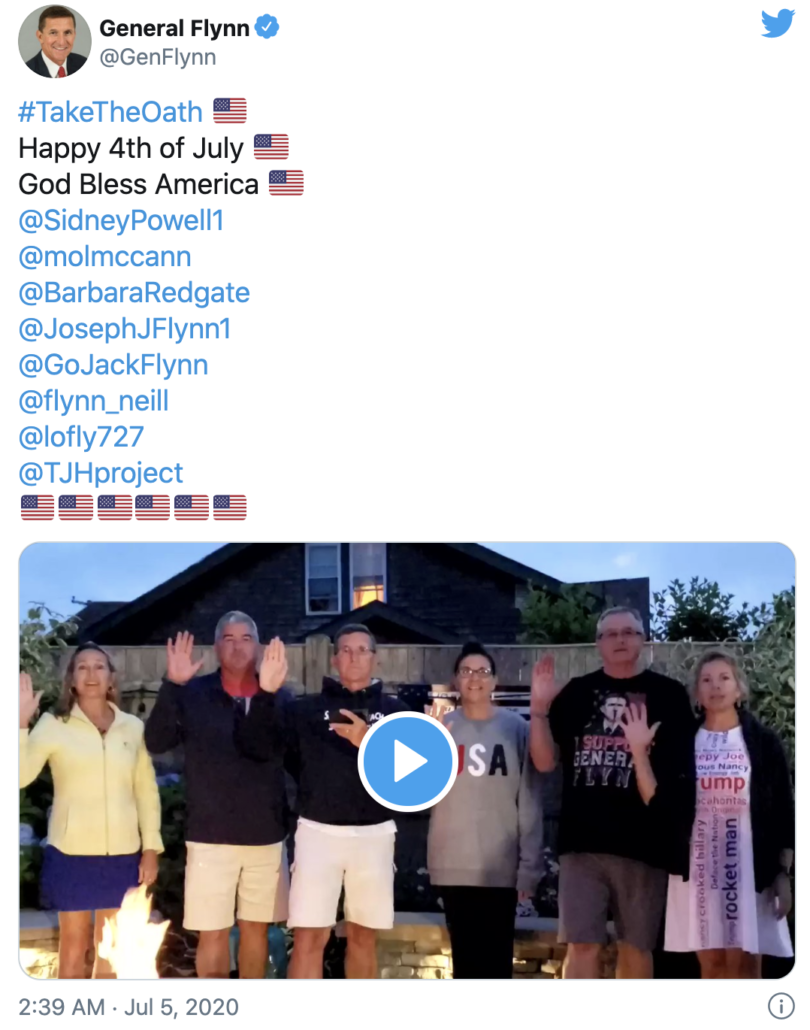
In May — that is, before Flynn formally pledged allegiance to QAnon — the FBI released a bulletin warning that QAnon, along other conspiracy peddlers, had become a domestic terrorist threat.
Got one of his gang members prosecuted for death threats against a judge
Before Flynn joined that gang, but significantly as a result of his fostering it, a member of QAnon took action on Flynn’s behalf, calling in death threats against Judge Sullivan and his staffers.
We are professionals. We are trained military people. We will be on rooftops. You will not be safe. A hot piece of lead will cut through your skull. You bastard. You will be killed, and I don’t give a fuck who you are. Back out of this bullshit before it’s too late, or we’ll start cutting down your staff. This is not a threat. This is a promise
Frank Caporusso was charged in August. In October he was ordered held without bail. He appears set to plead guilty on January 19.
Got a ruling — and, later, a clear statement from DOJ — that no abuse occurred
And with his two years of effort, Mike Flynn has gotten none of the exoneration he was seeking.
In a 92-page opinion last year, Judge Sullivan affirmed that Flynn’s lies were material and that, “Mr. Flynn has failed to establish a single Brady violation.”
A sentencing memo approved by all levels of Bill Barr’s DOJ also ruled that Flynn’s lies were material.
It was material to the FBI’s counterintelligence investigation to know the full extent of the defendant’s communications with the Russian Ambassador, and why he lied to the FBI about those communications.
[snip]
The defendant’s false statements to the FBI were significant. When it interviewed the defendant, the FBI did not know the totality of what had occurred between the defendant and the Russians. Any effort to undermine the recently imposed sanctions, which were enacted to punish the Russian government for interfering in the 2016 election, could have been evidence of links or coordination between the Trump Campaign and Russia. Accordingly, determining the extent of the defendant’s actions, why the defendant took such actions, and at whose direction he took those actions, were critical to the FBI’s counterintelligence investigation.
[snip]
As the Court has already found, his false statements to the FBI were material, regardless of the FBI’s knowledge of the substance of any of his conversations with the Russian Ambassador. See Mem. Opinion at 51-52. The topic of sanctions went to the heart of the FBI’s counterintelligence investigation. Any effort to undermine those sanctions could have been evidence of links or coordination between the Trump Campaign and Russia.
In a filing in June, Jocelyn Ballantine laid out that Flynn had gotten the discovery required, and stated clearly that his claims of prosecutorial misconduct were unfounded.
Before Flynn’s 2017 guilty plea, the government provided Flynn with (1) the FBI report for Flynn’s January 24 interview; (2) notification that the DOJ Inspector General, in reviewing allegations regarding actions by the DOJ and FBI in advance of the 2016 election, had identified electronic communications between Strzok and Page that showed political bias that might constitute misconduct; (3) information that Flynn had a sure demeanor and did not give any indicators of deception during the January 24 interview; and (4) information that both of the interviewing agents had the impression at the time that Flynn was not lying or did not think he was lying.
The government subsequently provided over 25,000 pages of additional materials pursuant to this Court’s broad Standing Order, which it issues in every criminal case, requiring the government to produce “any evidence in its possession that is favorable to [the] defendant and material either to [his] guilt or punishment.” Doc. 20, at 2. The majority of those materials, over 21,000 pages of the government’s production, pertain to Flynn’s statements in his March 7, 2017 FARA filing, for which the government agreed not to prosecute him as part of the plea agreement. The remainder are disclosures related to Flynn’s January 24, 2017, statements to the FBI, and his many debriefings with the SCO.
The government disclosed approximately 25 pages of documents in April and May 2020 as the result of an independent review of this case by the United States Attorney for the Eastern District of Missouri. While those documents, along with other recently available information, see, e.g., Doc. 198-6, are relevant to the government’s discretionary decision to dismiss this case, the government’s motion is not based on defendant Flynn’s broad allegations of prosecutorial misconduct. Flynn’s allegations are unfounded and provide no basis for impugning the prosecutors from the D.C. United States Attorney’s Office. [my emphasis]
An interview report DOJ submitted actually hid material evidence that the pro-Trump agent who pushed back against the investigation of Flynn for his Russian ties worked well with Brandon Van Grack, but effectively, even Bill Barr’s star witness refuted Sidney Powell’s claims of misconduct.
Finally, in Judge Sullivan’s order dismissing Flynn’s prosecution as moot, he made a number of findings of fact, effectively finding that nothing DOJ has been throwing at the wall since May changes Mike Flynn’s guilt.
- The government’s assertion that there was confusion surrounding Mike Flynn’s interview does not change that his lies were material.
- DOJ’s [draft] conclusion that Flynn was not an agent of Russia does not change that his lies were material.
- The evidence impeaching Peter Strzok and others does not change that Flynn’s lies were material (and, as Sullivan notes, even the government agreed before Flynn pled guilty).
- Nothing in the public record substantiates that the 302 of January 24, 2017 Flynn’s interview does not accurately reflect what happened in the interview.
- Flynn’s claims to be forgetful are not consistent with the fact that, as the incoming National Security Advisor, he personally asked Sergey Kislyak to undermine President Obama’s policy before Trump took office.
- Nothing in Bill Priestap’s notes call into question the legitimacy of the Mike Flynn interview.
- The government could have relied on Mike Flynn’s admissions at trial.
Mike Flynn has spent two years trying to deny that he was guilty of lying to obstruct an investigation. The record remains that he did.
Exposed his son to further prosecution
As part of his claim to have been railroaded, Flynn accused Robert Mueller’s prosecutors of threatening his son. Documents that would have otherwise eventually been released (the warrants targeting Flynn) made it clear that his son was the first to claim legal exposure, threatening to plead the Fifth in July 2017 to avoid testifying about his work with his dad. Documents that Flynn submitted to the docket show that Mueller had an understanding, but pointedly avoided promising not to prosecute Jr.
Now that Flynn’s plea has been voided, Jr could hypothetically be added as a co-conspirator in any retrial of Bijan Kian, with Flynn Sr — who is immune from legal jeopardy — possibly forced to testify against his son.
I think Trump will do something to make sure this is unlikely. But the risk is out there that, after purportedly pleading guilty to save his son, Flynn will have made his son’s jeopardy worse.
Exposed DOJ to further scrutiny
DOJ’s excuses for trying to blow up Flynn’s prosecution were transparently bogus — and conflicted with each other. That, in and of itself, suggested DOJ was not entitled to the presumption of regularity.
But along the way, DOJ submitted a package of altered documents to the docket. That led Sullivan to require DOJ to certify everything they submitted — and then to insist after DOJ tried to dodge the order. DOJ stopped well short of certifying everything, and lied in the filing doing so. All those issues remain unresolved in Sullivan’s docket.
Proved Judge Sullivan’s point about selling his country out
Two years ago today, at the aborted sentencing hearing, Judge Sullivan observed (misstating when Flynn’s secret relationship with Turkey ended) that Flynn had “arguably” sold out the flag.
I mean, arguably, that undermines everything this flag over here stands for (indicating). Arguably, you sold your country out. The Court’s going to consider all of that.
In the three weeks since Flynn was pardoned, he has done just that, twice called on Trump to use the military to rerun a vote that might keep Trump in power.

